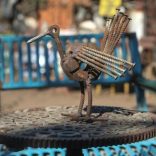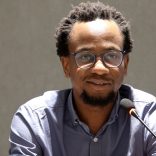Italian-Mozambican Jazz Festival kicks off in Maputo
“I never revealed the secrets of war” – General Chipande launches his first book today

Photo: Notícias
Reserve General Alberto Joaquim Chipande today launches in Maputo the first volume of his autobiography, entitled “Como Eu Vivo a Minha História” [How I Live My History], with President Filipe Nyusi attending. It is a narrative of the man who fired the first shot in Chai, Cabo Delgado, initiating the national liberation struggle, and published 43 years after the independence of Mozambique from the Portuguese colonial yoke.
General Chipande served as Minister of National Defence from Independence (1975) to demobilisation (and the reserve) on the arrival in Mozambique of the United Nations force, ONUMOZ, for the operationalisation of the Peace Agreement signed in October 1992. In conversation with Noticias, he said he had never revealed the secrets of the colonial war, in strict observance of the decision that had been made by the joint military mission in 1975 at Mavalane airport in the country’s capital, in the context of the Lusaka Accords.
According to the decision taken at Mavalane airport in 1975, the military should keep the secret of the colonial war for 30 or 40 years or at least 20 years, so as not to offend sensitivities on either side.
Alberto Chipande said that Portuguese colonial generals and soldiers, including Kaulza de Arriaga, commander of operation Gordian Knot, which aimed to eliminate the Liberation Front of Mozambique (FRELIMO) in six months, unilaterally broke the agreement that was made that day by writing and publishing works about the war in Mozambique.
“At the last meeting held on June 24, 1975, at the airport, while we waited for President Samora Machel plane to land, the joint commission decided that everything that happened during the ten years of war in Mozambique should not be published, but should be a secret,” Chipande said, indicating that it was for this reason that he had never said or published anything about the colonial war so far.
He added that, as a result of being the person responsible for the decision taken by the group [the joint military mission], he himself had to comply with it. Those colleagues who were not part of the joint commission could and did write, especially in these last years. General Chipande, respecting the agreement, did not.
“The Portuguese generals and military who fought in Mozambique, including Kaulza de Arriaga and Antonio de Spinola himself, all wrote memoires and books. They have published books on the war in Mozambique before the agreed period, and so breached [the agreement],” he said, pointing to writings on operation Gordian Knot and the books of the four Portuguese generals who conducted the war by way of example.












Leave a Reply
Be the First to Comment!
You must be logged in to post a comment.
You must be logged in to post a comment.